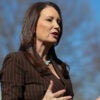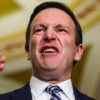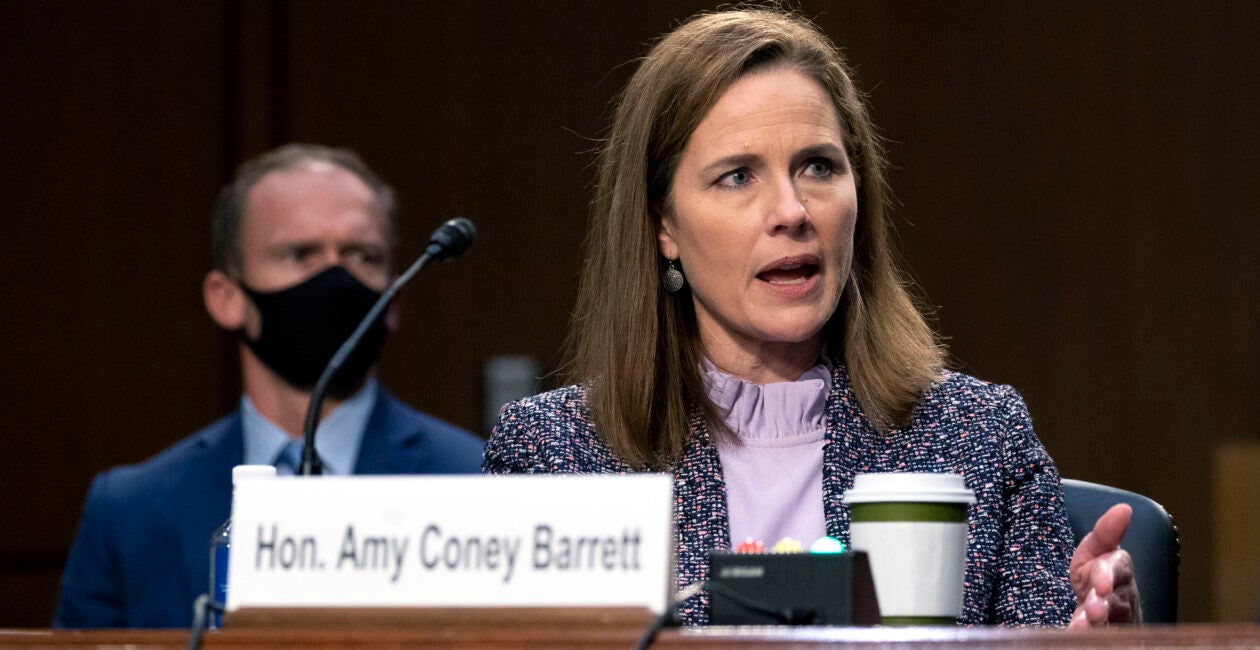On the third and final day of confirmation hearings for Supreme Court nominee Amy Coney Barrett, senators revisited some issues covered the day before but also detoured into a president’s ability to pardon himself and the high court’s resolution of the 2000 presidential election.
Democrats and Republicans on the Senate Judiciary Committee also had to wait out technical difficulties with the audio in the hearing room.
President Donald Trump announced Sept. 26 that he would nominate Barrett, a judge on the 7th U.S. Circuit Court of Appeals, to replace the late Justice Ruth Bader Ginsburg on the Supreme Court.
The Daily Signal depends on the support of readers like you. Donate now
Here are seven takeaways from Day 3 of the confirmation hearing.
1. Presidential Power
Sen. Patrick Leahy, D-Vt., pressed Barrett on the limits of presidential power regarding pardons and the Supreme Court’s power to require a president to obey a court order.
Barrett referenced a founding document, Federalist 78, to talk about the constitutional limits of the judiciary.
“Courts have neither force nor will. In other words, we can’t do anything to enforce our own judgments,” Barrett said. “So, what I meant in the conversation with you is that as a matter of law, the Supreme Court may have the final word. But the Supreme Court lacks control over what happens after that. The Supreme Court and any federal court has no power, no force, and no will, so it relies on the other branches to react to its judgments accordingly.”
Leahy followed by asking: “Is a president who refuses to comply with a court order a threat to our constitutional system of checks and balances?”
Barrett, 48, answered by bringing up the high court’s unanimous 1954 ruling in Brown v. Board of Education to end “separate but equal” racial segregation in public schools.
After the high court decided that case, Arkansas Gov. Orval Faubus, a Democrat, used the state’s National Guard to prevent desegregation of schools in Little Rock in 1957. President Dwight Eisenhower, a Republican, federalized the National Guard and sent the 101st Airborne into Little Rock to enforce federal law.
“The example of Brown is a perfect one in this instance because the Supreme Court in Brown, of course, held that segregation violated the [Constitution’s] Equal Protection Clause,” Barrett said. “That was the law. But as you know, there was resistance to that decision. As you know, it wasn’t until the National Guard came in and forced Gov. Faubus to allow desegregation that could happen, because the Supreme Court couldn’t do so itself.”
Leahy pressed her again on whether a president could disobey a high court order.
“As I said, the Supreme Court can’t control whether or not the president obeys,” Barrett responded. “Abraham Lincoln once disobeyed an order during the Civil War of a circuit court. So, a court can pronounce a law and issue a judgment, but it lacks control over how the political branches respond to it.”
Leahy went on to ask: “Would you agree no one is above the law?
Barrett responded, “I agree that no one is above the law.”
With that, Leahy asked: “Does a president have an absolute right to pardon himself for a crime? We heard this question after President Nixon’s impeachment.”
Barrett suggested that this could be a matter that goes before the Supreme Court and thus not something she could address.
“So far as I know, that question has never been litigated. That question has never arisen,” Barrett said. “That question may or may not arise. It’s one that calls for legal analysis for what the scope of the pardon power is. Because it would be opining on an open question when I haven’t gone through the judicial process to decide it, it’s not one in which I can offer a view on.”
Leahy replied: “I find your answers somewhat incompatible.”
2. Feinstein ‘Really Impressed’
Sen. Dianne Feinstein, D-Calif., the ranking member of the Judiciary Committee, said she was “impressed” by an answer from Barrett.
A key attack from Democrats has been that Barrett’s confirmation would mean the end of the Affordable Care Act, better known as Obamacare. That’s because a case called Texas v. California is heading to the Supreme Court.
Texas and other states assert that because Congress removed the law’s individual mandate requiring Americans to buy health insurance, the rest of the law is unconstitutional. They note that the high court held in 2012 that the Obamacare law was constitutional because the individual mandate was a tax.
Earlier in the hearing, Senate Judiciary Chairman Lindsey Graham, R-S.C., initially asked Barrett about the “doctrine of severability.”
Barrett said courts make a “presumption of severability” and consider the intent of the legislature.
Severability means that if one provision of a law passed by Congress is struck down by a court it doesn’t necessarily mean the entire law is struck down when that provision is severed.
Graham asked, “The doctrine of severability has a presumption to save the statute if possible, is that correct?”
Barrett affirmed it was.
Later, Feinstein followed up to ask Barrett to explain the meaning of the doctrine of severability again.
Barrett told Feinstein that severability tries not to undo the work of the elected branch of Congress.
“Severability strives to look at a statute as a whole and say, ‘Would the Congress have considered this provision so vital that, sort of [like] in a Jenga game, pulling it out, Congress wouldn’t want the statute anymore?’” Barrett said.
“I think, insofar as it tries to effectuate what Congress would have wanted, it’s the court and Congress working hand in hand,” the judge said.
This answer pleased Feinstein, who, as the committee’s ranking member, leads opposition to the nominee.
“Thank you. That’s quite a definition. I’m really impressed,” Feinstein said.
3. ‘I Have My Own Mind’
Sen. Chris Coons, D-Del., asked Barrett about her position when the late Justice Antonin Scalia, the conservative stalwart for whom she once clerked, dissented from the views of Ginsburg, the liberal icon whose seat Barrett would fill.
Barrett responded that she wouldn’t automatically vote in lockstep with Scalia. She previously had stated that originalists may differ on a specific case.
“I do share Justice Scalia’s approach to text, originalism and textualism,” she said, adding:
But in the litany of cases that you just identified, the particular votes that he cast are a different question from the way he applied those principles in particular cases. I hope you aren’t suggesting that I don’t have my own mind, that I couldn’t think independently, or that I would just say, ‘Well, let me see what Justice Scalia has said about this in the past.’
I assure you, I have my own mind. But, everything that he said is not necessarily what I would agree with or what I would do if I were Justice Barrett. That was Justice Scalia.
4. Educating Durbin on 15th Amendment
Barrett explained twice to Sen. Dick Durbin, D-Ill., that the Constitution prohibits the government from denying the right to vote based on race or gender.
On each occasion, Durbin seemed unwilling to accept her answer.
“Does the president have the authority to unilaterally deny the right to vote to any person based on their race? What would your answer be?” Durbin asked Barrett.
Barrett tried to explain the 14th and 15th Amendments to the Constitution to Durbin, which wouldn’t allow such discrimination. She said:
Senator, obviously there are many laws in effect, including the Equal Protection Clause, which prohibits discrimination on the basis of race, including the 15th Amendment, which protects the right to vote against discrimination based on race. So, there is a principle in constitutional law called external constraints. Even if one evaluates what authority a branch has to act, there are external constraints from other parts of the Constitution. Here, it would be the 14th and 15th Amendments.
Durbin spoke almost as if he were correcting the judge when he said, “Well, of course it would. The 15th Amendment.”
Durbin then read the 15th Amendment to Barrett as if educating the judge about the amendment she had just finished explaining to him.
“When asked whether or not a president has the authority to unilaterally deny that right to vote based on a person’s race or even gender, are you saying you can’t answer that question?” Durbin said.
Barrett again explained to Durbin that two amendments to the Constitution would prevent such discrimination:
Senator, I just referenced the 14th and 15th Amendments, the same one that you just repeated back to me, that do prohibit discrimination on the basis of race in voting. So, as I said, I don’t know how else I can say it. The Constitution contains provisions that prohibit discrimination on the basis of race in voting.
Durbin became frustrated, telling Barrett: “It strains originalism if the clear wording of the Constitution establishes a right and you will not acknowledge it.”
Barrett—who was generally very restrained through the hearing—turned his phrase around.
“Senator, it strains the canons of conduct which don’t permit me to offer off-the-cuff reactions or any opinions outside of the judicial decision-making process,” Barrett said. “It would strain Article 3 [of the Constitution], which prevents me from deciding legal issues outside the context of cases and controversies. And, as Justice Ginsburg said, [it would] display disregard for the whole judicial process.”
5. ‘Punch Through a … Concrete Barrier’
Graham talked about the historic nature of Barrett’s likely confirmation by the Senate.
“There’s one group in America I think has had a hard time of it, and that’s conservatives of color and women conservatives,” Graham said, adding: “This hearing, to me, is an opportunity to not punch through a glass ceiling, but a reinforced concrete barrier, around conservative women.”
Although Barrett, if confirmed, would be the fifth woman to serve on the high court, Graham said, she would be the first conservative, pro-life, Christian woman to serve there.
“This is history being made, folks,” he said. “This is the first time in American history that we’ve nominated a woman who is unashamedly pro-life and embraces her faith without apology. And she’s going to the court.”
6. Bush v. Gore
One of the more unusual exchanges came with Sen. Amy Klobuchar, D-Minn., who talked about the fact that Barrett was part of the legal team for then-Republican presidential candidate George W. Bush after the post-2000 election recount in Florida, in the case called Bush v. Gore.
In the final count, Bush, then governor of Texas, defeated the Democratic candidate, Vice President Al Gore, by fewer than 600 votes in Florida, to win that state’s 25 electoral votes.
Klobuchar noted that Chief Justice John Roberts and Justice Brett Kavanaugh also were part of the Bush legal team as the election-deciding case went to the Supreme Court.
“Many argue that Bush v. Gore, to go back to your earlier work, hurt the court’s legitimacy,” Klobuchar said. “If you are confirmed, the Supreme Court will have not one, not two, but three justices—you, Justice Kavanaugh, and Chief Justice Roberts—who worked on behalf of the Republican Party in matters related to the Bush v. Gore case. Do you think that is a coincidence?”
Barrett seemed puzzled by the question.
“Sen. Klobuchar, if you are asking me whether I was nominated because I worked on Bush v. Gore for a very brief period of time as a young assistant, that doesn’t make sense to me,” Barrett said.
Klobuchar responded, “It’s just such a coincidence to me.”
“I actually didn’t know it until yesterday,” she added. “Having justices with this background, two of whom are appointed by the current president, decide any cases related to the upcoming election, do you think that will undermine the legitimacy of the court?”
Barrett perceived this line of questioning as inviting her to comment on a possible matter that would come before the high court.
“Asking whether something would undermine the legitimacy of the court or not seems to be trying to elicit a question about whether it would be appropriate for justices who participated in that litigation to sit on the case rather than recuse,” Barrett said. “I went down that road yesterday.”
Klobuchar: “You said you wouldn’t recuse.”
Barrett: “That’s not what I said.”
Klobuchar conceded, “You’re right. You said you wouldn’t announce your recusal and you wouldn’t commit to recusing.”
“Again, I think the public has a right to know that now three of these justices have worked on the Republican side on a major, major issue related to a presidential election,” the Minnesota Democrat said.
7. Roe, Heller, and Citizens United
Barrett has declined to say how she might rule on highly political precedents such as Roe v. Wade when pressed by Democrats on the committee. Sen. Mazie Hirono, D-Hawaii, named several pending abortion-related cases.
Graham stressed that cases currently being litigated seemingly could go against other Supreme Court rulings.
“One of the reasons you can say with confidence that Brown v. Board of Education is superprecedent is that you are not aware [of] any effort to go back to the good old days of segregation by a legislative body. Is that correct?” Graham asked Barrett.
Barrett answered, “That is correct.”
She added that the Brown decision finding school segregation unconstitutional was consistent with an originalist view of the Constitution.
“I’ve also said in lectures that Brown is correct as an original matter,” Barrett said. “That is the kind of thing, since I have said it in writing, I feel I could express before the committee.”
Graham raised other issues, such as the case of District of Columbia v. Heller in 2008 in which the Supreme Court recognized that the Second Amendment applies to an individual’s right to bear arms rather than a collective right to bear arms.
“When it comes to Heller, there is legislation all over the country passing laws regarding gun ownership,” Graham said. “Are you aware of that?”
Barrett replied, “I am aware of that.”
Graham followed up by citing the 2010 Citizens United v. FEC case on free speech in political campaigns.
“When it comes to Citizens United, I think there will be some efforts after this election to maybe revisit that case,” Graham said.
“The thing that I am trying to establish here is that Heller, Citizens United, Roe, Casey are all being actively litigated because legislative bodies are playing in that arena. Is that a fair statement?” Graham said.
Barrett responded: “That’s a fair statement.”
8. Technical Difficulties
When Sen. Richard Blumenthal, D-Conn., began questioning Barrett, the audio went down in the Judiciary Room of the Hart Senate Office Building.
“What, are we not paying the bills?” Graham said jokingly.
The committee went into recess and then came back.
Blumenthal resumed his questions of Barrett. Close to the end of his questions, though, the audio again went out temporarily.
Sen. Thom Tillis, R-N.C., spoke after Blumenthal and his microphone briefly stopped working. The second fix did the trick.






























